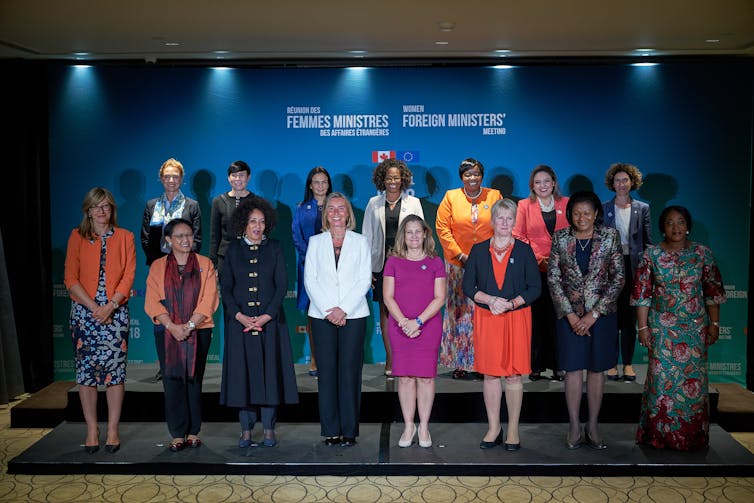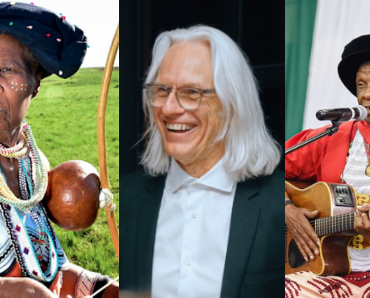-
play_arrow
On The Street On The Air | Kaya 959
South Africa doesn’t have enough women in foreign policy. Why it matters.
By: Jo-Ansie van Wyk, University of South Africa

Andre Pichette/EPA-EFE
The first ever conference of women foreign ministers took place in Canada last year.
Ministers from 17 countries, including Ghana, Kenya, Namibia, Rwanda and South Africa, attended.
Prior to the meeting Sweden and Canada had already committed to pursuing feminist foreign policy. This focuses on the abolition of all forms of gender domination and oppression and aims to overcome gender stereotypes. It also seeks to give women the opportunity to participate in decision making, to represent the state, and execute the “hard” issues related to a country’s external relations and status.
For policies like this to be implemented, women need to be appointed to key foreign policy and diplomatic positions. And women issues need to be added to foreign policy principles, priorities and objectives.
South Africa is one of at least 17 countries that has a woman foreign minister. Since 1994, all but one of the country’s foreign ministers have been women. My ongoing research aims to determine whether female foreign affairs ministers – and the presence of other women in the foreign policy establishment – mean that South Africa’s foreign policy embodies the principles of feminism.
Feminism in SA’s foreign policy
South Africa’s post-apartheid foreign policy has been extensively studied and written about. But there’s scant feminist analysis of the policy. And the country itself doesn’t describe its foreign policy as feminist but rather as having women on its foreign policy agenda.
Race and patriarchy have historically subjugated the position of women leaders in South Africa. Both white and black women in South Africa have culturally been idealised as mothers, and not as politically influential actors.
The role of black women in the liberation struggle has been recognised. But the governing African National Congress (ANC) Women’s League has often been criticised for being too traditional. It’s also been accused of submitting to patriarchy.
One example of this was the League’s support of former president Jacob Zuma during his 2006 rape trial.
The gender dynamics within the party also recently came under scrutiny after senior members were accused of sexual harassment and rape but never prosecuted.
High profile women appointees or deployed ANC cadres are expected to operate in this environment. They also remain underrepresented in positions of influence. Men outnumber women in Parliament. And less than half of President Cyril Ramaphosa’s Cabinet is female.
All of this suggests that despite the appointment of women to senior foreign policy positions as ministers, deputy ministers, ambassadors, and diplomats, South Africa’s government and foreign policy is still male-dominated.
Women leaders
The South African Constitution identifies the president as the country’s main foreign policy actor with the minister appointed to the foreign affairs portfolio is second to the president. Since 1994, every South African president has been a man. All the deputy presidents were men, apart from Phumzile Mlambo-Ngcuka. She served between 2005 and 2008.
In contrast, only one man – Alfred Nzo – served as foreign minister from 1994-1998. His successors have all been female. These women, including Deputy President Mlambo-Ngcuka, all have influential male family connections in the governing party.
When it comes to the national assembly, women are still outnumbered. However, their representation in Parliament has increased significantly from 2.7% before 1994 to 42.7% in 2019.
Women are also notably under-represented in other structures related to South Africa’s international relations. These include the parliamentary portfolio committee on international relations and cooperation, as well as the ANC’s own subcommittee on international relations, and ministerial advisory bodies like the South African Council on International Relations.
No woman has served as chairperson of the oversight portfolio committee since 1994. Nor has any woman served as the chairperson of the ANC’s Subcommittee on International Relations, although it has female members. The party’s International Relations Rapid Task Team, which was created during Jacob Zuma’s tenure, has never been led by a woman.
Women as a policy agenda and priority are also largely absent from the ANC’s International Relations Discussion Document of 2017, the White Paper on the Diplomacy of Ubuntu, and the Foreign Service Bill currently serving in Parliament.
And women are also notably under-represented in the Department of International Relations and Cooperation. The department has had only had male directors generals since 1994. Its current gender composition remains skewed in favour of men.

This could explain why women are not well represented in diplomatic circles. By 2019 only 36% (38 of 104) of the country’s heads of mission are female.
Only two of the eight ministerial advisers appointed since 1994 have been women. And only five members of the South African Council on International Relations are female. The chairperson is a man.
What does this mean?
Quantitatively, women remain under-represented in the country’s foreign policy establishment. Qualitatively, the framing of the country’s foreign policy does not allow women an equal seat at the table.
My preliminary assessment of the presence of women in South Africa’s foreign policy establishment concludes that the country has failed to oppose and abolish all forms of gender domination and oppression.
Women in foreign policy are still woefully under-represented. The policy-making process, policy content and environment, and the implementation process is still dominated by men.
This raises questions about the feminist orientation of the few women decision makers. It also raises questions about the continued influence and prevalence of male-focused structures and cultures in the ruling party, the executive, and the Department of International Relations and Cooperation.
The prognosis for a feminist South African foreign policy remains poor as long as women are excluded from or under-represented in the main areas of the country’s foreign policy establishment.![]()
Jo-Ansie van Wyk, Professor in International Politics, University of South Africa
This article is republished from The Conversation under a Creative Commons license. Read the original article.
Written by: Natasha
Similar posts
-
MORE ARTICLES
-
QUICK LINKS
UpComing Shows

959 Music Weekdays
Kaya 959 Hits
Real. Familiar. Memorable. Kaya 959 brings you the music you know and love from our playlist. Uninterrupted. Thursdays 20h00 to 21h00
close
The Best T in the City
With T Bose
He has held it down in the world of mid-morning radio with the best music, riveting topics, brilliant mixes and interesting guests. Every weekday, The Best T proves why he is the BEST by connecting to you like only your bro or favourite uncle could. He lets his listeners dictate the songs they want to hear in the ever-popular Top 10 at 10, and his Three Teaspoons never run out. Catch The Best T in the City Mondays to Fridays from 09h00 to 12h00.
close
Feel Good
With Andy Maqondwana
Feel good about feeling good! That's exactly what The Feel-Good show is about. An escape from the negativity that surrounds us, indulging you in good feels. Pass it on to one and all. Spread the good feeling around Gauteng with Andy Maqondwana.
close
The Hive
With Bonolo "Bee Sting" Molosiwa
Every "Hive" needs a Queen B and Bonolo "Bee Sting" Molosiwa is Kaya 959's honey who brings in the money. With her bubbly personality, infectious laugh, Bee Sting radiates positive energy which is all you need to get your weekend off to the best start. Don't miss the Afrobeat Dancehall Ragga (ADR) Top 10 on The Hive with Bee Sting every Saturday from 18h00 - 21h00.
closeConnect with Kaya 959
DownLoad Our Mobile App
© 2024 Kaya 959 | On The Street On The Air
















